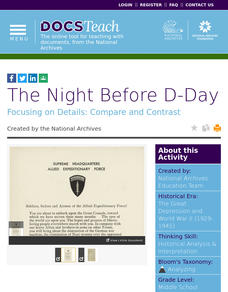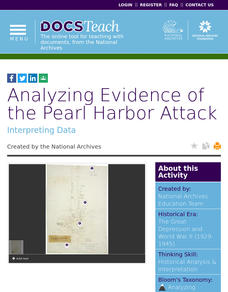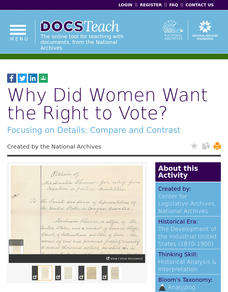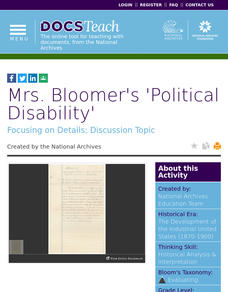DocsTeach
Two Versions of FDR's Infamy Speech
Historians follow FDR's Infamy speech from rough draft to the official address to the Senate. An intriguing activity compares and contrasts FDR's original speech to the official version. Academics also listen to FDR address the Senate....
DocsTeach
The School Lunch Program and the Federal Government
The school lunch program is rooted in the struggles of the Great Depression and is still assisting families today. Academics research documents and images relating to the creation of the school lunch program. Scholars use a worksheet to...
DocsTeach
The Night Before D-Day
Get inside the mind of General Eisenhower regarding the D-Day invasion. An interesting activity uses historical documents to highlight the differences between Eisenhower's public stance on D-Day and his private opinions. Scholars analyze...
DocsTeach
The New Deal: Revolution or Reform?
Scholars weigh in on FDR's New Deal policies in an in-depth activity. The resource uses historical documents to explore whether the New Deal polices were reformatory or revolutionary. Learners review documents, rate them using a scale,...
DocsTeach
Pearl Harbor Dispatch Analysis
Scholars play a historical version of the telephone game when they analyze the dispatch from the Pearl Harbor attack. The quick activity uses primary sources to help academics analyze an historical event. Young historians also complete a...
DocsTeach
Letter to Truman about the Manhattan Project
Delve into the past to understand the opposition to the Manhattan Project. An interesting activity is designed to be completed in pairs, groups, or individually. Scholars analyze historical documents, complete an online worksheet, and...
DocsTeach
Confronting Work Place Discrimination on the World War II Home Front
Before the Civil Rights Movement was in full swing, FDR's executive order helped promote fair employment. The activity uses primary documents to explore FDR's executive order to help minorities gain equal employment and pay during the...
DocsTeach
Analyzing Evidence of the Pearl Harbor Attack
Don some detective caps and delve into the past to explore the evidence left behind after the attack on Pearl Harbor. An interesting activity uses primary sources to explore how the United States Navy was caught off guard and how the...
DocsTeach
Analyzing a Writing Assignment by a Teenage Refugee in New York During World War II
Young historians delve into the world of teenage refugees during WWII to understand their experiences. The activity focuses on a writing assignment from a teen staying at a US refugee camp to explore the struggles they faced, such as...
DocsTeach
Analyzing a Photograph of Amelia Earhart
Amelia Earhart forever changed the idea of who could be pilots. The activity helps young academics examine a photo of Amelia Earhart to understand what it tells individuals about the past. Scholars participate in group discussions and...
National Park Service
Lesson 6: Researching Contemporary Slavery
While many believe slavery ended after the American Civil War, it continues today in various forms. Using a WebQuest research project, class members investigate how the institution of slavery lives on in the modern world. Activities also...
National Park Service
Lesson 5: Coded Spirituals, Metaphor in African Spirituals
If a picture is worth a thousand words, song lyrics also can communicate many meanings. Using the lyrics of spirituals, young historians analyze them for coded messages about freedom. Resources include a chart to help individuals track...
National Park Service
Lesson 4: Escape
Some enslaved people decided to run for their liberation. Using lyrics of songs they sang, young historians look at these anthems of freedom. An assessment asks them to write the story of escape from the perspective of an enslaved person.
National Park Service
Lesson 3: Resistance
During the time of slavery, resistance was a way of life for the men and women held in bondage. Using music as evidence of their fight against oppression, learners explore how enslaved people fought back. Writing prompts round out the...
National Park Service
Lesson 1: Journaling with Songs of Freedom
There's more to music than a memorable tune. The songs of those who were enslaved reveal the harsh realities of their lives. Using both songs and slave narratives, historians uncover this hidden history. The lesson incorporates a variety...
DocsTeach
Why Did Women Want the Right to Vote?
No taxation without representation may have been the battle cry of the American Revolution, but women used the same argument when demanding their right to vote in the late 1800 and early 1900s. Young historians examine petitions from...
DocsTeach
The Settlement of the American West
What do Abraham Lincoln and the Transcontinental Railroad have in common? Using a set of primary source documents, including pictures, maps, and treaties, class members link together the common themes of expansion into the American West....
DocsTeach
Suffragist Susan B. Anthony: Petitioning for the Right to Vote
What is the best way to get a point across: a petition or a protest? Using primary sources, including a petition from Susan B. Anthony and a photo of a White House protest from the early 1900s, young historians examine what women did to...
DocsTeach
Reasons for Westward Expansion
"Go West, young man!" is a familiar refrain in American history. But why did people leave their homes in the East to travel westward and what impact did that movement have on people already living in the American West? By examining...
DocsTeach
Patent Analysis: J.W. Davis and Levi Strauss's Fastening Pocket Openings
Commonplace today, the zipper and button construction of blue jeans was a major innovation. Using the patent for the J.W. Davis and Levi Strauss innovation, individuals comb an image of the fly for clues. Afterward, they discuss its...
DocsTeach
Patent Analysis: Alexander Graham Bell's Telephone
Believe it or not, the plugs and wires on Alexander Graham Bell's patent application for telegraph improvements has a direct connection to devices today. Young historians examine the fine details of the patent application. After they...
DocsTeach
Patent Analysis: Thomas Edison's Lightbulb
Watch lightbulbs go off in learners' heads as they look at a patent for Thomas Edison's most famous invention. After examining the light bulb patent, young historians speculate on how the invention changed life in the 1880s and its...
DocsTeach
Mrs. Bloomer's 'Political Disability'
It's hard to believe that women had to argue for the right to vote a mere 100 years ago. Today, young historians can examine their case left behind in primary sources. Using a letter from a woman who claimed she should be able to vote...
DocsTeach
Evaluating Perspectives on Westward Expansion
Although popular culture tells the story of the American West simplistically, its reality is far more complex. Native American tribes—while already on the land—didn't have the same interests, and conflicts between white settlers and...

























